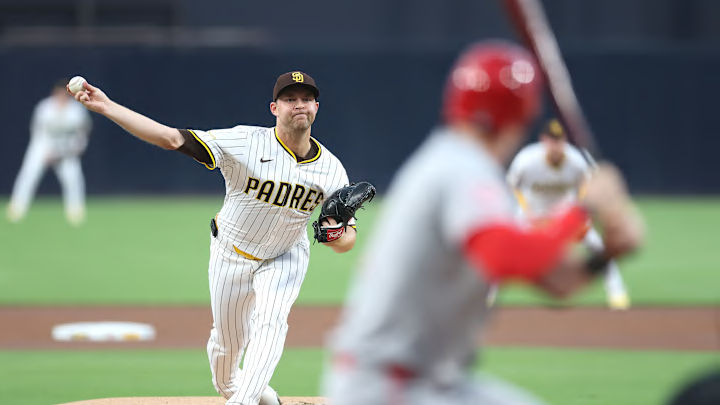Every offseason brings a few surprises, but this one just got interesting for teams searching for pitching help. Michael King declined his mutual option with the San Diego Padres, making himself a free agent at exactly the right time. His mix of command, movement, and poise makes him the kind of pitcher who doesn’t dominate headlines but quietly makes rotations stronger wherever he lands.
That, of course, is where the New York Mets come in. They’ve seen enough patchwork pitching to know arms like King don’t linger long on the market. But before anyone starts picturing him in orange and blue and dreaming about October nights in Queens, there’s a catch. King’s freedom comes with a cost — one steep enough to make even one of the richest front offices stop and think twice before making their move.
A potential qualifying offer could complicate how Michael King fits with the Mets
King’s decision to decline his mutual option didn’t just make him available — it made him one of the most intriguing middle-tier arms on the market. Injuries limited him to just 15 starts in 2025, but even in a shortened season, he was steady: a 3.44 ERA, .241 xBA, and 76 strikeouts across 73.1 innings. Those aren’t fluke numbers — they’re the sign of a pitcher who still gets outs, still limits damage, and still owns the strike zone.
The catch is that San Diego still holds the power to complicate things. If the Padres extend King a qualifying offer — projected at $22.025 million for 2026 — any team that signs him would forfeit its highest second- and fifth-round picks plus $1 million in international bonus money. The Mets already paid that price once for Juan Soto. Paying it again for a starter would raise a fair question: how much future capital are they really willing to trade for present stability?
It’s a costly choice, but Michael King’s stuff might make the Mets consider it
It’s a question worth asking, because King’s track record makes the answer tempting. His 2024 season in San Diego was a revelation — 31 starts, a 2.95 ERA, and a .226 xBA. He ranked in the top three percent of MLB in hard-hit rate that year, striking out 201 batters in 173.2 innings while showing he could handle a full workload for a contender.
A significant part of that success lies in his mastery of off-speed pitches. His changeup has been a weapon, holding hitters to a .207 average in 2024 and an absurd .181 in 2025, complemented by a sweeper that keeps right-handers guessing. Statcast pegs him among the top ten percent of MLB in offspeed run value — a skill set built for durability, even if the radar gun doesn’t grab headlines.
That’s what makes King such a fascinating match for the Mets. In a free-agent market likely to reward arms like Ranger Suárez and Framber Valdez with major paydays, King represents the middle ground: upside without the decade-long commitment. His injury-shortened 2025 season should also limit his deal length to around three to four years, with a market value of around $23 million annually. Add in his familiarity with New York from his Yankees days, and the fit feels almost too logical.
The Mets can afford the loss of future picks because of their top-ranked farm system and Steve Cohen’s willingness to spend wherever there’s a need. King may not reshape a franchise, but he’d steady one. The Mets don’t need a splash; they need stability. And Michael King offers exactly that, with a little crown polish on top.
